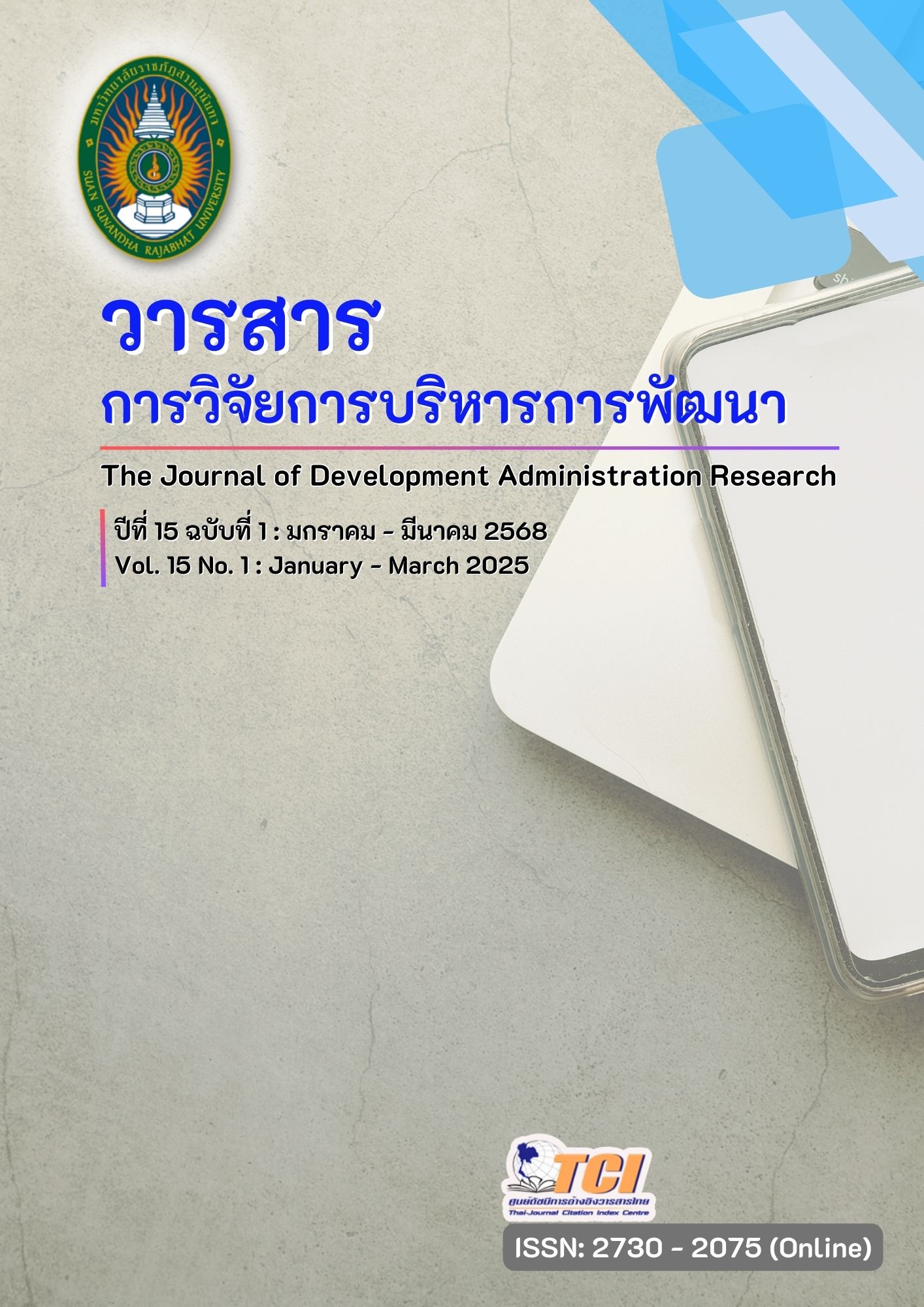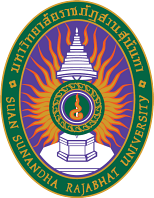An Innovative Management Model for the Development of Pedagogical Content Knowledge (PCK) for Teachers of Less Commonly Taught Languages (LCTLs) in Universities in Yunnan Province, China
คำสำคัญ:
Pedagogical Content Knowledge (PCK), Less Commonly Taught Languages (LCTLs), Teacher Efficacy, Ecological Systemsบทคัดย่อ
This study investigates the development of Pedagogical Content Knowledge (PCK) among teachers of Less Commonly Taught Languages (LCTLs) in universities in Yunnan Province, China. Using a mixed-methods approach that integrates the Theory of Planned Behavior (TPB) and Ecological Systems Theory (EST), the research identifies key factors influencing PCK. It proposes an innovative management model for enhancing PCK among LCTL teachers. A sample of 243 LCTL teachers was surveyed, complemented by in-depth interviews with 34 teachers. Quantitative data were analyzed using Structural Equation Modeling (SEM), while qualitative data were analyzed with NVivo software.
The demographic analysis revealed a predominantly female sample (77.8%) with most teachers aged 31-40 (66.7%). Reliability analysis indicated strong measures consistency (Cronbach's alpha: 0.835-0.868). Significant correlations were found between PCK and teacher attitudes (r = 0.344, p < 0.01), efficacy (r = 0.456, p < 0.01), and environment (r = 0.399, p < 0.01). SEM results highlighted teacher efficacy (Standardized Estimate = 0.405, p = 0.011) and ecological environment (Standardized Estimate = 0.54, p < 0.001) as strong predictors of PCK development. The study confirms the critical impact of teacher efficacy, attitudes, and ecological environment on PCK development. An innovative management model is proposed, focusing, on promoting positive teacher attitudes, optimizing teacher ecosystems, enhancing teacher efficacy, and providing continuous professional development. These strategies aim to improve teaching quality and efficacy among LCTL teachers, ultimately benefiting foreign language education in Yunnan Province.
เอกสารอ้างอิง
Ajzen, I. (2020). The theory of planned behavior: Frequently asked questions. Human Behavior and Emerging Technologies, 2(4), 314-324.
Bronfenbrenner, U., & Evans, G. W. (2000). Developmental science in the 21st century: Emerging questions, theoretical models, research designs and empirical findings. Social Development, 9(1), 115-125.
Cochran, K. F., DeRuiter, J. A., & King, R. A. (1993). Pedagogical content knowing: An integrative model for teacher preparation. Journal of Teacher Education, 44(4), 263-272.
Daly, C., Milton, E., & Langdon, F. (2020). How do ecological perspectives help understand schools as sites for teacher learning? Professional Development in Education, 46(4), 652-663.
Du, M., & Feng, J. (2020). An exploration of the assessment of teachers' subject teaching knowledge. Curriculum, Teaching Material and Method, 40(1), 130-135.
Fishbein, M., & Ajzen, I. (1975). Belief, attitude, intention, and behavior: An introduction to theory and research. Addison-Wesley Pub. Co.
Hellmich, F., Löper, M. F., & Görel, G. (2019). The role of primary school teachers’ attitudes and self‐efficacy beliefs for everyday practices in inclusive classrooms–a study on the verification of the ‘Theory of Planned Behaviour’. Journal of Research in Special Educational Needs, 19, 36-48.
Jacobson, E. D. (2017). Field experience and prospective teachers' mathematical knowledge and beliefs. Journal for Research in Mathematics Education, 48(2), 148-190.
Lippard, C. N., Lamm, M. H., & Riley, K. L. (2017). Engineering thinking in prekindergarten children: A systematic literature review. Journal of Engineering Education, 106(3), 454-474.
Parker, P. D., Marsh, H. W., Ciarrochi, J., Marshall, S., & Abduljabbar, A. S. (2014). Juxtaposing math self-efficacy and self-concept as predictors of long-term achievement outcomes. Educational Psychology, 34(1), 29-48.
Rahman, M. M. (2023). Sample size determination for survey research and non-probability sampling techniques: A review and set of recommendations. Journal of Entrepreneurship, Business and Economics, 11(1), 42-62.
Scharf, R. J., DeBoer, M. D., Guerrant, R. L., & Guerrant, R. L. (2016). Recent advances in understanding the long-term sequelae of childhood infectious diarrhea. Current Infectious Disease Reports, 18(11), 35.
Shulman, L. S. (1986). Those who understand: Knowledge growth in teaching. Educational Researcher, 15(2), 4-14.
Toma, R. B., & Greca, I. M. (2018). The effect of integrative STEM instruction on elementary students’ attitudes toward science. Eurasia Journal of Mathematics, Science and Technology Education, 14(4), 1383-1395.
Wang, J. (2020). Improving knowledge sharing in virtual teams: the relationship between leader-member exchange and knowledge sharing behaviour. Knowledge Management Research & Practice, 18(4), 385-393.
Wang, J., & Zhu, N. (2021). Analysis and optimization path of young university teachers' subject teaching knowledge development from the perspective of knowledge management. Heilongjiang Researches on Higher Education, (10), 81-85.
Wang, S., & Luo, S. (2021). Construction of teachers' subject teaching knowledge integrating artificial intelligence. Journal of Educational Science of Hunan Normal University, 20(4), 68-74.
Yim, M. S. (2019). Do international students really belong? Exploring the role of a sense ofbelonging in the intercultural communication classroom. Communication Education, 68(1), 25-47.
ดาวน์โหลด
เผยแพร่แล้ว
รูปแบบการอ้างอิง
ฉบับ
ประเภทบทความ
สัญญาอนุญาต
ลิขสิทธิ์ (c) 2025 วารสารการวิจัยการบริหารการพัฒนา

อนุญาตภายใต้เงื่อนไข Creative Commons Attribution-NonCommercial-NoDerivatives 4.0 International License.
บทความที่ได้รับการตีพิมพ์เป็นลิขสิทธิ์ของมหาวิทยาลัยราชภัฏสวนสุนันทา
ข้อความที่ปรากฏในบทความแต่ละเรื่องในวารสารวิชาการเล่มนี้เป็นความคิดเห็นส่วนตัวของผู้เขียนแต่ละท่านไม่เกี่ยวข้องกับมหาวิทยาลัยราชภัฏสวนสุนันทา และคณาจารย์ท่านอื่นๆ ในมหาวิทยาลัยฯ แต่อย่างใด ความรับผิดชอบองค์ประกอบทั้งหมดของบทความแต่ละเรื่องเป็นของผู้เขียนแต่ละท่าน หากมีความผิดพลาดใดๆ ผู้เขียนแต่ละท่านจะรับผิดชอบบทความของตนเองแต่ผู้เดียว




